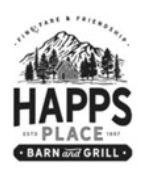Happs Place Barn and Grill is a local institution in Glenville, North Carolina. Honoring the town's long history, the owners, Ol Happ's Place Restaurant, LLC, resurrected an old, shuttered restaurant and crafted a new modern building from the bones of the former restaurant, along with an old house and a historic cabin and barn. The owners also resurrected the Happs Place name and designed a logo that played on the restaurant's mountain roots and casual feel:

Ol Happ's hit a snag, however, when seeking registration of
its mark at the USPTO. The Examining Attorney refused to register
the logo, citing a prior registration for the mark,  Registration No. 4352367, which
identifies "catering services; restaurant services." The
Examining Attorney also required a disclaimer of the word
"Grill." Ol Happ's disputed both refusals and,
failing to convince the Examining Attorney, appealed the final
refusal to the Trademark Trial and Appeal Board, where Ol
Happ's achieved mixed results.
Registration No. 4352367, which
identifies "catering services; restaurant services." The
Examining Attorney also required a disclaimer of the word
"Grill." Ol Happ's disputed both refusals and,
failing to convince the Examining Attorney, appealed the final
refusal to the Trademark Trial and Appeal Board, where Ol
Happ's achieved mixed results.
The Disclaimer Battle
Having already disclaimed "Fine Fare", "Estd 1997", and "Place", Ol Happ's drew the line at disclaiming "Grill", arguing that the phrase "Barn and Grill" in its logo is a unitary phrase that enables it to avoid the requirement to disclaim the admittedly descriptive word "Grill." The TTAB agreed, explaining that "an exception to a disclaimer requirement exists . . . if the descriptive term at issue is so merged together with other elements of a composite mark, that they form a unitary, non-descriptive whole that renders a disclaimer unnecessary." Applying that standard, the TTAB found the phrase "Barn and Grill" to be a double entendre that both brings to mind a restaurant with a literal barn and a literal grill and also evokes the well-known phrase "Bar and Grill." Finding that the public would make these connections "fairly readily" from the mark itself and in relation to the services the mark identifies, the TTAB concluded that a disclaimer of "Grill" was not necessary.
The Section 2(d) War
Turning next to the restaurant's argument that the differences in the appearance of its mark and the Hap's Pit Barbecue logo were sufficient to avoid consumer confusion, the TTAB took the opportunity to emphasize that its "determination as to the similarity of the marks is based on the recollection of the average purchaser who normally retains a general, rather than specific, impression of trademarks . . . and given the fallibility of memory, recollection is based on an overall general impression and not minute details or specific characteristics of the marks." In other words, Examiners need not apply a "purely mechanical" assessment of each mark's design elements, words, syllables, and letters, but rather may determine likelihood of confusion by general impressions.
Applying this principle, the TTAB determined that the words HAPPS and HAP'S in the parties' marks were dominant, in view of the size, position and emphasis of those words and the disclaimed and descriptive nature of the marks' other literal elements. Thus, the TTAB was not swayed by the applicant's argument that the "myriad of design elements and the litany of additional wording" in the marks at issue sufficiently distinguish them from each other. In addition, although examiners are required to evaluate marks in their entireties, the TTAB rejected the applicant's argument that giving greater weight to the marks' shared use of the word "Haps" violated the "anti-dissection" rule. In the eye of the TTAB, there was no doubt that HAPPS and HAP'S were "the primary source-identifying" words in the parties' marks and the marks were thus confusingly similar, despite the differences in the designs and other words. That fact, coupled with the parties' identical services, trade channels, and class of purchasers, led the TTAB to affirm the refusal to register on likelihood of confusion grounds.
The case is In re Ol Happ's Place Restaurant, LLC, Serial No. 90738221 (January 26, 2024) (not precedential).
The content of this article is intended to provide a general guide to the subject matter. Specialist advice should be sought about your specific circumstances.


